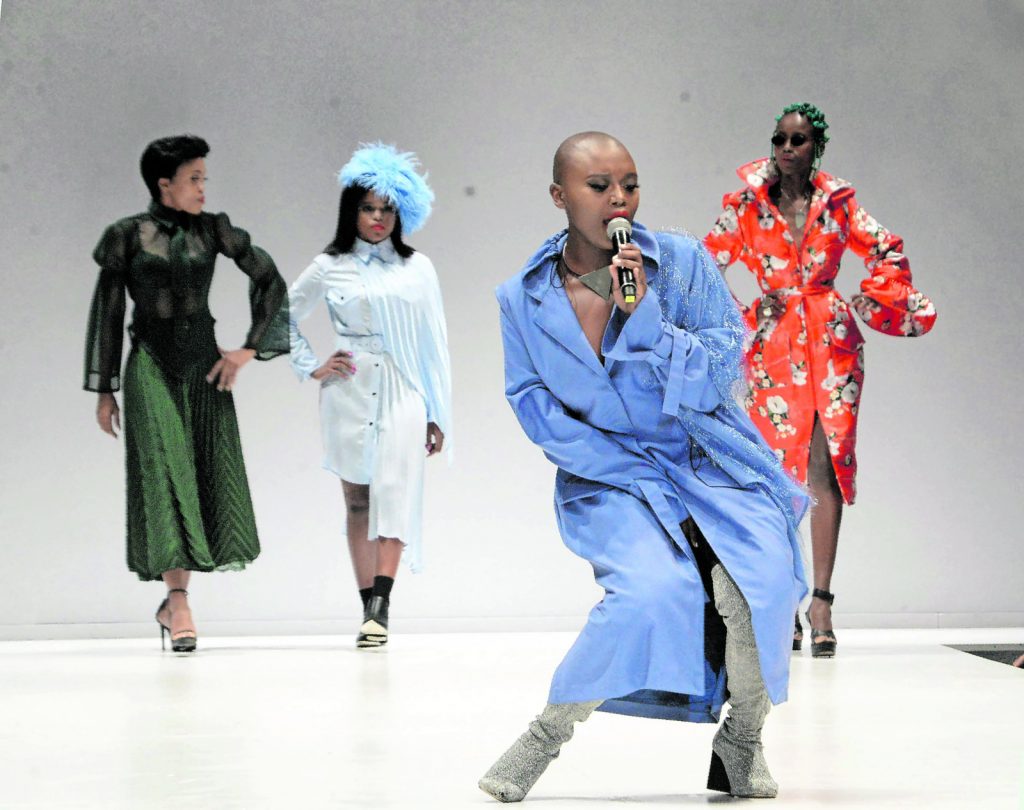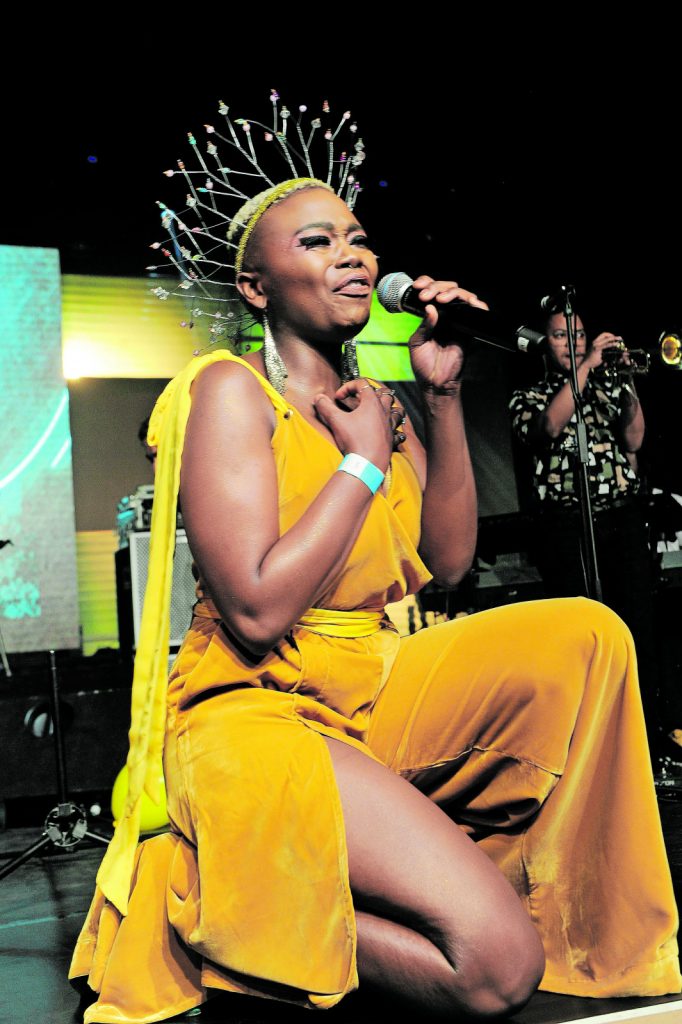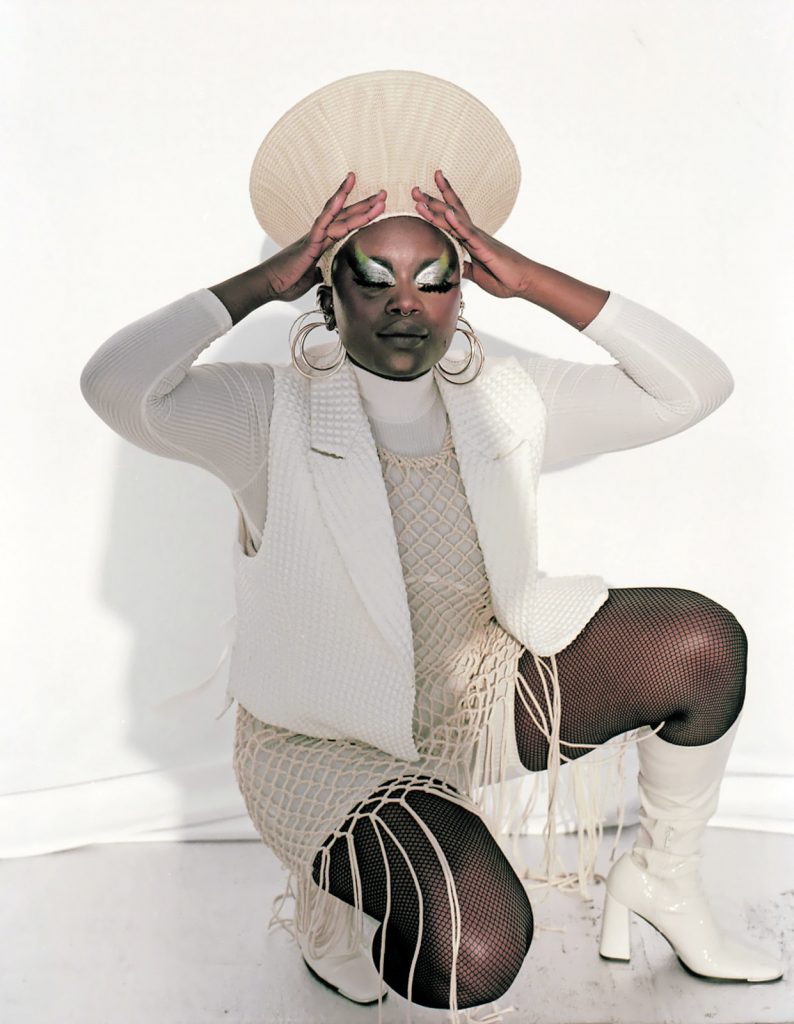Zoë Modiga celebrated the second anniversary of her sophomore album, Inganekwane, with a live performance in Stellenbosch on the 26th of June, a Sunday. She had had two band rehearsals in that same week, and a radio interview on SAFM during which she spoke candidly about some of her recent achievements, which include a song placement for “Abantu” on the Netflix series, Savage Beauty. She also has a cameo on the same show.
Some three weeks prior, her outernational cultural-melting-pot-as-band, Seba Kaapstad, had embarked on a tour of Johannesburg and Cape Town. In April, she headlined Ukubonga, a Bassline Live and BET event which took place at the Lyric Theatre.

Following Stellenbosch, she’s off to play what her bassist and Inganekwane producer, BandaBanda, suggests to be a headliner slot at the North Sea Jazz Festival in Rotterdam, Netherlands (she’s on at 8.30pm on Saturday July, at the Mississippi stage). She forms part of a South African cohort that includes The Malcolm Jiyane Tree-O, Nduduzo Makhathini, and Bokani Dyer. They shall all be sharing the bill with the likes of Michael Kiwanuka, Erykah Badu, Lous and the Yakuza, Tiwa Savage, Diana Ross, and more.
Though her list of recent and older achievements roll smoothly off the tongue, much like butter when it melts, it’s the self-funded, self-executed initiatives of self-love-through-art that are more crucial. These align with the independent cultural work ethos that led to her refusing to sign a recording contract for her debut offering, Yellow: The Novel — a modern-day masterpiece released in 2017 on her own imprint, Yelloëwax.
“I didn’t want to worry too much about trying to tick the many boxes that you sometimes have to tick because you’re associated with entities like [record labels],” she revealed in an interview.

For instance, she decided to go on a multi-city tour with BandaBanda and keyboardist, Curt Petrus when restrictions were being eased and we could all partly gather in 2021, and capped off that year with a behemoth of a set in Braamfontein’s Mangrove, where party people cried, laughed, and smiled over the course of two hours while inner-city House music discourses loomed and boomed at venues nearby.
Finding the ‘How’
During one of the many conversations in that Yellow: The Novel era, she had spoken about how it was “in-season” for her affirmations, and how the dreams she’d been travelling through time with were being made manifest in the worldly realm.
“I’m just finding that things are falling into place, in some weird way,” she’d shared. “There was a time when I was, well, not questioning whether or not this is something I am supposed to do; but there was a time where I was wondering how it’d all work out. Because when we do these things that we do, we have the ‘what it is’, but we never know the ‘how’? We’re all just living and trying to find the ‘how’?”
The Modiga’s are Batswana people from the Tshwane area, who ended up in KwaZulu-Natal as a result of her maternal grandfather’s South-Eastwards migration. He settled in Embali, Pietermaritzburg.

Inganekwane came to Modiga at a point when she was questioning what it means to refer to herself as a Zulu woman, and the themes touched upon on that album hinge upon a deep spiritual quest to discover more of herself, and to locate herself within the greater context of Africanness. Language is central throughout that quest: How we express ourselves, and what we access through expressing ourselves in our given tongues.
“I think, as a people, the idea of language has been kind of played with and taken from us. Part of me having recorded this body of work allows me to claim the power of language back, and express through it; and [to] also make my own understandings, because it’s a journey for me as well,” she says.
“Inganekwane has themes that pertain to abantu abamnyama (black people); there are themes that relate to knowing that something is within you. There are themes that talk about our Creator (umdali wethu). Much like how Yellow: The Novel ran through what human existence is, and what it looks like, but telling it through [the perspective of] the mother tongue.”
While Inganekwane follows a linear theme, centred mostly around language and the many ways to stretch it, its predecessor is an open field of ingenuity that leaps across 23 ‘chapters’ that can be conveniently grouped into four parts. “Abounding Within” covers the first section, which is this dormant place inside of us all governed by love; a place where peace and truth abound. “Love, Yahweh” is, much like “Umdali” on Inganekwane, a note of gratitude to her Creator. The song’s head-nod factor doesn’t distract from its central message; in fact, it aids in its delivery: The Creator’s love is boundless, and knows no limits. Performed live, it becomes an out-of-body experience; a full-on sermon where the gospel of emancipatory love and understanding of an All-Seeing deity are celebrated outside of religion’s bind, closer to the spiritual elements that Modiga continues to centre in all she creates. “Yakhal’inkomo”, which her earliest followers will recall from its Soundcloud origins, mirrors “Ilanga Lishonile” in that it pays homage to her predecessors – tata Winston Mankunku Ngozi on the former, and mama Miriam Makeba on the latter.
A Special Gift
The stage is where Modiga thrives, what with her being a graduate of the National School of the Arts, which gave her a strong background in theatre and performance. She then passed through different corridors of knowledge at University of Cape Town’s South African College of Music, where she received the training in jazz that stands her in good stead to this day. That she is an alumni of the institution also places her in the same league as legends such as Bhudaza Mapefane and Selaelo Selota; and contemporaries such as Thandi Ntuli, Shane Cooper, Benjamin Jephta, and Ndumiso Manana, her bandmate in Seba Kaapstad.
She has the special gift of finding the best people to collaborate with in both fashion and music. Her debut at the Cape Town International Jazz Festival in 2015 saw her supported by Bokani Dyer on piano – he also appears on Yellow: The Novel; the highly versatile Romy Brauteseth on bass; the musical discipleship of Robin Fassie-Kock on trumpet; the driving beat of Marlon Witbooi on drums; and the dizzying clank of Keenan Ahrends, who’s always pushing himself to attain a higher form on the fretboard of his guitar. Her rendition of Nina Simone’s “Four Women” won the SAMRO Schools scholarship that she utilised in part to record her debut project in that same year.
She was a competitor on the first season of singing competition, The Voice, in 2016. Under the mentorship of Lira, she showcased her versatility by singing rock songs (Nirvana’s “Smells Like Teen Spirit”); ballads (Freshlyground’s “I’d like”); and pop songs (Rihanna’s “Diamonds”). While she didn’t win, she did leave an indelible mark.
Nods of Approval
The band rehearsals, held at a cozy studio space in Randburg, were four hour-long marathons of stretching and flexing upon well-worn territory; of searching for new ways to play old songs, as well as remembering old techniques for new(er) audiences.
Drummer Ire Boladji, who can’t make the tour, was nonetheless present to offer a hand, and did a great job of demonstrating to the featured drummer how to set up the introductory groove to “Lengoma”, which Modiga released as Inganekwane’s lead single. Across the room was Bandabanda, whose nods of approval were followed up by a smile and a bellow of bass notes that add complexity to the already tight groove.
One could almost envision how it would be received by the audience — a nod here; a ‘we love you Modiga’ there; and, elsewhere, a crew of first-time arrivals who stumbled upon the show, also nodding in approval. All the while, Modiga’s followers, sitting at some 30, 000-plus, experienced the rehearsals unfold via her Instagram live.
She goes on live fairly frequently, Modiga: to speak to her people while doing her make-up, to let them third-wheel the ride during radio interviews, and so forth.
“I’m actually so grateful for how seen the people that gravitate towards my music make me feel. This [IG Live] is my way of thanking you for that, and thanking you for allowing me to tell stories that make sense to you. I’ll always be grateful for that. I find social media weird sometimes, so I’m always trying to find ways to get to my people, and to be able to talk about all times of random [stuff],” she tells the people tuning in during one of her live’s.
A multi-faceted creator
She says, in response to a question about appeasing audiences, that she has been trying to make sense of the kind of artist that she wants to be. This process has taken the form of her acknowledging that she is a “multi-faceted creator that can only ever really go by being a singer/songwriter and performer.” She adds that she is fully aware that people aren’t going to give her a warm reception at every turn, and that there are some who the bandwagon shall leave destitute in a landfill of seekers.
Modiga continues: “I’ve [taken] time between records to establish an era, and to be known as an era artist, where each and every album has its own sonic inspiration, its own visual inspiration. I’ve been enjoying expressing [myself] in that way, and being able to create worlds with each body of work. In my mind, I’m hoping that it gives the audiences that have come to listen to my music the time to enjoy an era thoroughly for a good two-to-three years.”
Modiga also hopes that this approach will give people a sense of ownership over those projects that will then free her to explore other corners of her multiverse.
“I did find that when I released Yellow: The Novel, there was a certain reception [that lacked] when I released the second album. I did feel that there was a shift in terms of the music lovers. I’m not entirely sure if all the people that were into Yellow were into Inganekwane, but I definitely saw a shift in the audiences,” she says.
Finding the ‘Next’
Something new is brewing outside of the rehearsal space, and far away from the upper echelon of Jozi cool she’s been hanging around. It’s closer to her artistic core; to her grand vision and her ancestors. This moment is familiar territory for her – a moment to pause and reflect on what has been as a way to map out what’s coming. She reveals some off-the-record stages she’s already ticked, and then gets into the ‘what’ of her next nesting.
“I know that I’m being given the bones and the marrow, and I’m getting into the meat soon. As soon as we come [back] from the Netherlands, I think I’ll be getting into my little cocoon again, creatively, and just let the Divine [to] lead the way. I know that I’m having strong feelings about certain things, whether that’s a musician here, an idea there, a soundscape here. It’s really just pieces of a puzzle that are beginning to shape up, which is usually [how] the next era [announces itself].”
Modiga foresees the next era as a merging of the first two.
“It’s kind of like the bridge, but an entirely different world altogether. But then again, I’m not entirely sure. This is where I will dig deep and I will dedicate time. I create eras so that [I can] create worlds. I feel like I’m the universe — or maybe I’m the Milky Way, and God is the Universe; and I feel like we are in this partnership and this collaboration and this inspired space of creating planets, and I think the eras feel like planets. That’s how I’m making sense of eras right now,” concludes Modiga.
- Zoë Modiga headlines the North Sea Jazz Festival’s Mississippi Stage on Saturday, 9th July. Both her albums are available on streaming platforms.